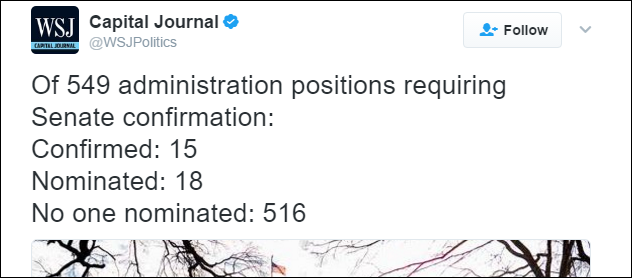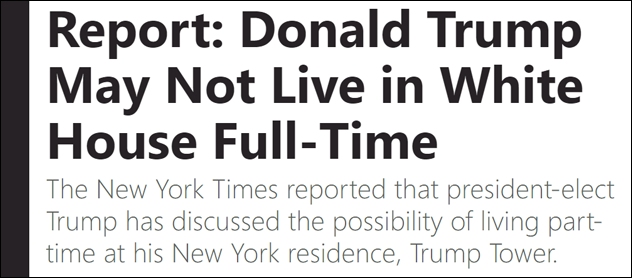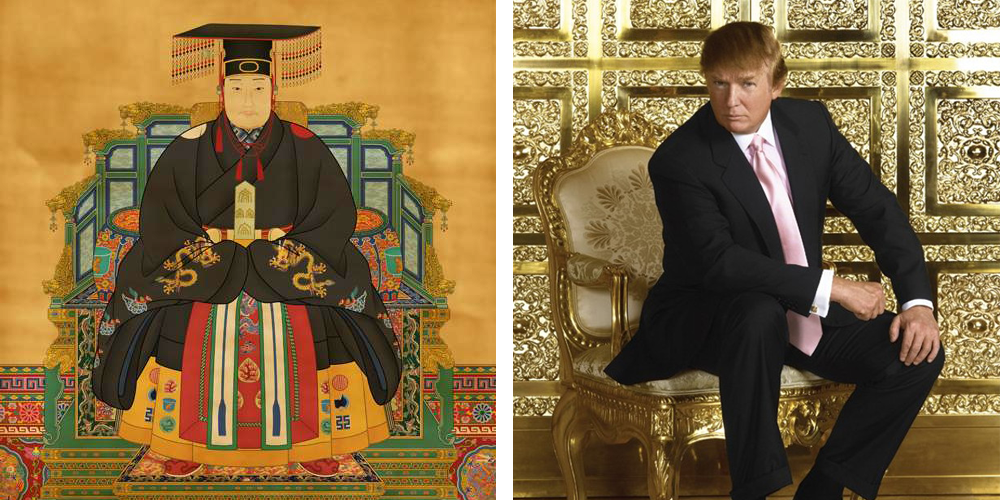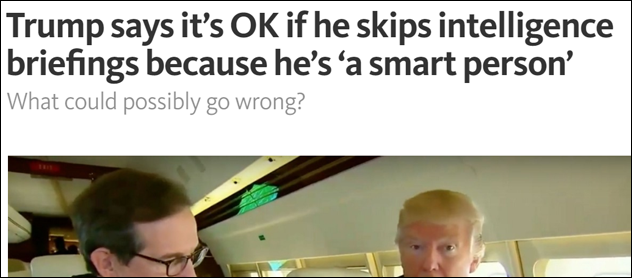
.
Dear Sweden,
Here in America, most civilians are upset about recent events in the nation’s political life. At the M. Joakim Eriksson Center for American Decline, we try to take the long view and focus on larger trends. Therefore, we have serial connected four Intel® Core™ i7 processors and overclocked them at 14.4 GHz. Our pattern recognition algorithm, powered by this super-terminal, is running day and night trying to identify repetitive motifs in cyclical batches of historical data. Earlier today, the computer identified the following signal: President Donald Trump is the reluctant Wanli Emperor of Ming Dynasty.
Consider the following four data points:
1. On Morning Meetings
The Wanli Emperor refused to attend morning meetings, see his ministers or act upon memoranda.
2. The Appointment of Officials

The Wanli Emperor refused to make necessary personnel appointments, and as a result the whole top echelon of the Ming administration became understaffed. He did, however, pay close attention to the construction of his own tomb, a magnificent structure which took decades to complete.
3. Time at the Office


The Wanli Emperor grew bored with the bickering eunuchs of the court and instead favored vacations on the Western Lake, around the area that would later house the Summer Palace.
4. Military Spending

During Japan’s invasion [of Joseon] from 1592 to 1598, the emperor sent more than 100,000 soldiers and he spent a vast amount of money for warfare, roughly equivalent to 5 years of state tax revenue. Many historians claim that this war completely destroyed the Ming’s economy and sped up the downfall of dynasty.
Conclusion: President Trump is losing the Mandate of Heaven
Throughout the millennia, China has been governed by an array of disinterested rulers, like the Huizong Emperor of Song Dynasty and the Qianlong emperor of Qing Dynasty. And they all signaled that their respective dynasties were in decline and that the dynastic cycle was about to progress to the next stage. This motif is universal and the lesson for America is clear: 2-4 presidents until barbarians cross into American territories. Perhaps they will topple the US government. Perhaps the US government will prevail. It is still too early to know. But in its short 238 year history, the American idea has never been less safe.
There are other important lessons we can draw from the lives of China’s disinterested rulers. For example, it is always a backstabbing eunuch that ultimately triggers the downfall of the ruler. Therefore, President Trump should keep an eye on his inner circle. The eunuchs are not the career civil servants that take on formal roles in the hierarchy of government. Instead, they are people from the lower classes who have desperately grasped at an opportunity. They have found a shortcut to power. They have paid a heavy personal price.
During the Ming dynasty, the Forbidden City contained a special eunuch clinic where candidates had their genitals removed while sitting on a special chair with a hole in it. Candidates that didn’t survive were carried away with their penis and testicles in a pouch for reunification in the afterlife.
Those who survive get to live in proximity to the emperor, but the genital wound never fully heals and the eunuchs are famous for their smell of urine. For us, only one question remains:
[poll id=”2″]


7 replies on “When the Emperor Loses Interest in Governing”
Brilliant—and horrifying!
Spicer. I bet you one rusty qing dynasty coin
The difference is Qianlong and Wanli started out as vigorous emperors. They only became disinterested rulers after decades on the throne. Trump’s only been in office a month!
“Disinterested” rulers are a positive thing. In your conclusion, you meant to write “uninterested”.
Are you a mind reader? How could you possibly know which word the author meant to write, especially when both words work well in the sentence to mean “not interested”?
i use comparisons between ming and late twentieth-century america a lot in teaching, not because the comparisons are particularly apt but because ming is a good example of being able to lose your country to corrupt officials and failing infrastructure. this comparison is horrifying alright, because the wanli emperor ruled for 32 years. if trump makes 32 weeks, it will be a miracle. and surprisingly, even after all the mishaps of the wanli years, the ming might still have been viable if the next three emperors had anything much going for them. let’s hope america has more than 24 years left when trump departs, whenever and however that is.
China follows more the Qing dynasty model of state failure than the Ming dynasty model, though. The Ming was founded by an insane autocrat who imposed despotism on his state and utilized a broken, over-centralizing constitution, which led to problems when later Emperors were less inclined to micromanage the state.
The Qing dynasty, in contrast, had a highly decentralized state with insufficient governance. Take the 1895 war, for instance, or even the Sino-French War. In both cases, the Chinese had far more military resources at their disposal, yet only a single regional army and navy was deployed to handle the fighting. In both cases, the Chinese empire was humiliated as three-quarters of its military might stood in garrisons. Insufficient governance, likewise, draws a comparison to the successful Meiji Restoration in Japan, wherein elites were able to make radical restructurings in society, whereas modernization and Westernization in the Qing proceeded in fits and starts and was not enough to save the dynasty from collapse.
The United States has the same problem. It, through its founding credo of checks and balances and federalism, has a relatively weak state that cannot perform needed reforms on a society that is growing more unequal by the day. and where corporate elites are gaining more power at the expense of the people. Its overarching military empire means that its forces are divided into directorates which are not fully assured reinforcement against a peer power.
If we look at the fundamental mistake of the Ming Dynasty, it was that it overcentrallized government into the person of the Emperor, who was often unsuited to take up the responsibilities that Zhu Yuanzhang had assigned him. The fundamental mistake of the Qing Dynasty was that it responded to governmental excess with governmental insufficiency, to the same predictable results as in the current United States. The comparison of American state failure should be made not to the Ming Dynasty, but to the Qing.